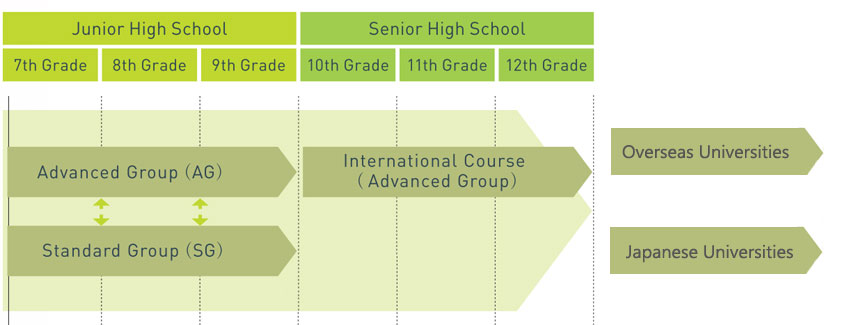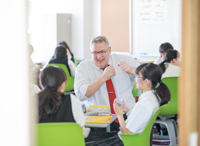
In junior high school the International Course is divided into two groups: the Advanced Group (AG), who are taught primarily in English, and the Standard Group (SG), which starts with the basics and aims to improve the students' English ability. In senior high school, all students belong to the Advanced Group.

The Best of Both Worlds
The International Course is designed to combine the best aspects of both a Japanese and international approach to education and to provide its students with not only the knowledge, skills and experience to lead fulfilling lives but also the language skills and cultural sensitivity to be able to do so in Japan, abroad or a combination of the two.
We believe by providing students with a strong understanding of and appreciation for cultural values, perspectives and behaviours of both Japan and other countries helps students not only understand and navigate our increasingly global world, but also develop a stronger understanding of themselves and their place within the world.

Dual Homeroom Teacher System
In both the International Course's junior and high school programs, each class is assigned one Japanese and one non-Japanese homeroom teacher. Not only does this provide students with guidance and support in terms of language, conduct and ways of thinking, it also enables effective communication with parents/guardians as well.

Two Groups
■ Advanced Group (AG)
Students in the Advanced Group are predominantly returnees and already have a high level of English. While we aim to strengthen their understanding Japanese culture and their command of the Japanese language, we aspire to cultivate critically thinking and internationally-minded students.
■ Standard Group (SG)
This group is for students who are learning English and wish to play an active part in the international community. Their English level is not tested upon admittance. By learning English they can then go on to study in Japan or overseas.
Curriculum (2023 Timetable)
|
|
|||||||||||||||||||||||||||||||||||||||||||||||||||||||||||||||||||||||||||||||||||||||||||||||||||||||||||||||||||||||||||||||||||||||||||||||||||||||||||||||||||||||||||||||||||||||||||||||||||||||||||||||
|
||||||||||||||||||||||||||||||||||||||||||||||||||||||||||||||||||||||||||||||||||||||||||||||||||||||||||||||||||||||||||||||||||||||||||||||||||||||||||||||||||||||||||||||||||||||||||||||||||||||||||||||||
COURSE FEATURES:
AG Math and Science (Junior High School)
The content taught in the AG math and science classes is closely linked to that of the Domestic Course. The textbooks used by the AG students are all in English, but the foreign teachers on the AG course are in constant consultation with the teachers on the domestic side and the progress being made is closely coordinated.
AG Japanese (Junior High School)
AG students entering Hiroo Gakuen have a wide range of experience and ability in Japanese. Each individual has a differing level of proficiency. From 7th grade, students in the AG are taught modern Japanese, classical literature and classical Chinese literature. If it is decided that the particular junior high school AG student has a high enough level, then that student can attend classes with the Standard Group.
AG Social Studies
Both English and Japanese are used to teach geography, history and civics. Texts written in both English and Japanese are used and a balance of both languages is promoted in the acquisition of knowledge in social studies. This is also an excellent opportunity for students to learn practical, useful language not covered in the regular English or Japanese classes.
FAQ
Frequently Asked Questions for students thinking about joining the International Course.
Please be aware of the following points if you are thinking of having your child join the International Course of Hiroo Gakuen.
- Q: Where are the foreign teachers from?
- A: We employ foreign teachers from a diverse range of countries. These include the United States of America, the United Kingdom, Australia, and New Zealand. All of our teachers are highly qualified and have a great deal of experience.
- Q: Are all International Course classes conducted in English?
- A: Basically, the majority of Advanced Group classes are conducted in English. However, Japanese Language classes, 'Kokugo' and some Social Science classes, Home Economics, PE and Health are conducted in Japanese. Please be aware students are expected to purchase both English and Japanese text books and study materials authorized by the Ministry of Education, Culture, Sports, Science and Technology. The latter are provided free for junior high school students.
Over half of lessons given to Standard Group students are conducted in Japanese, but they are also allocated a large number of special classes to improve their English ability. - Q: What special strategies do you have to help students who want to study at overseas universities?
- A: Homeroom teachers play a hands on role in providing academic counseling to their students. In high school, students are encouraged to take SAT®s and TOEFL® once a year. Students are also able to take AP® Exams for certain subjects as well.
- Q: Are graduation diplomas from Hiroo Gakuen International Department accepted by Japanese Universities?
- A: Yes. Diplomas from our International Department are perfectly valid for students taking Japanese university entrance exams. As an 'Ichijou' school, we present Japanese National Graduation Certificates to both junior and senior high students upon graduating.
- Q: Are the International department rules the same as those in the Domestic department?
- A: Yes. The same rules apply.
- Q: Is there a system for short study abroad programs?
- A: Short study abroad programs are available during summer vacation.
- Q: What happens in zero period and after school?
- A: During zero period (8:15 to 8:25 am) students are given learning various activities/materials to practice and develop various skills that are catered to their level and needs. Materials for zero period include: Tensei Jingo (a famous daily editorial from the Asahi newspaper that helps them improve Japanese reading and critical thinking skills), various math drills and activities and English editorials and essays which students read and respond to in writing.
After school, all students are encouraged to join a club and participate in club activities. Students are also encouraged to seek and participate in extracurricular activities outside of school (volunteer programs, competitions, internships etc). Many students also use the time after school to study and work on their weaker subjects. - Q: What universities and courses do the present International department students intend to follow?
- A: Some students intend to enter Japanese universities, some intend to study at overseas universities. At present, the International Course senior high third grade students are starting to make firm plans for their studies after graduation. While domestic universities popular with returnees include Waseda, Keio, Sophia, and Tokyo University of Science, many will apply to universities overseas.
- Q: Which countries have the present international course students lived in? How long did they spend overseas?
- A: International Course students have lived in 49 different countries ranging from North America, East Asia, other Asian countries and Europe. Over 50% of the students were overseas for a period of six to ten years.
- Q: What kind of interaction is there between the domestic and international sides of the the school?
- A: As mentioned above, the students have P.E. together. As well as being in clubs together, they also work side by side on other school events. (These include the sports festival, Schole study trips, the school 'Keyaki' festival and the music festival).
*Accurate as of February, 2021. (Please check for changes.)
- English Contents
-
- Our History
- International Course
- Junior High School International Course
- Junior High School Returnee Student Entrance Exam Admission Guidelines
- Junior High School International Transfer Student Exam Admission Guidelines
- Senior High School International Course
- Senior High School Returnee Student Entrance Exam Admission Guidelines
- Senior High School International Transfer Student Exam Admission Guidelines
- Map
- Inquiries
- Request Guidebook
- Web Pamphlet
